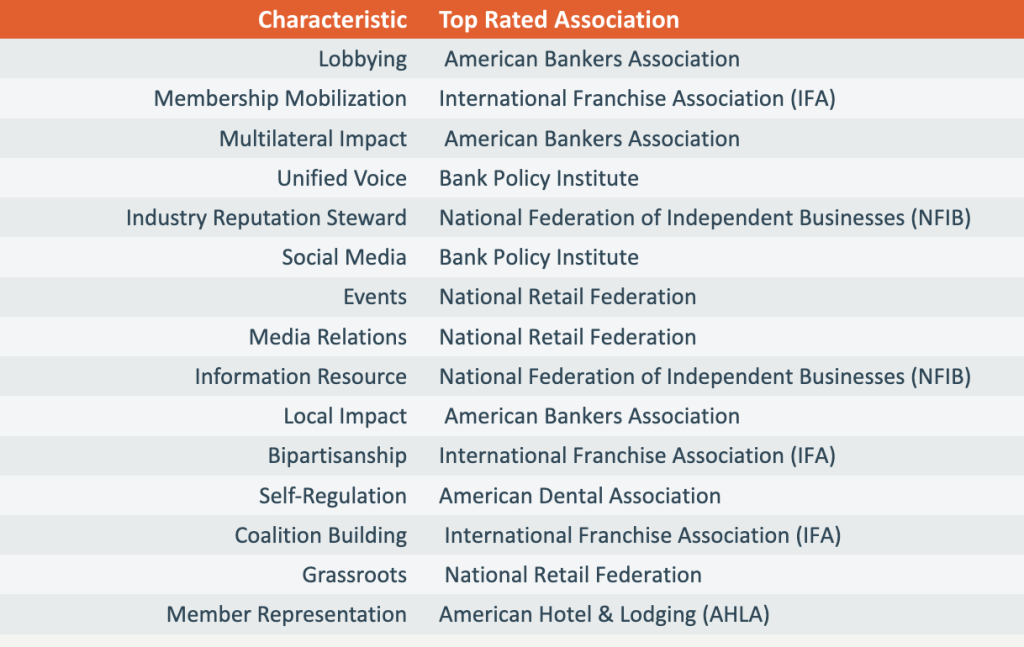
APCO’s 2024 ‘TradeMarks’ Study: Associations Show Strength on Unity and Connections
October 8, 2024
Washington – October 8, 2024: Following two years of declining effectiveness ratings following a post-COVID high, most Washington, D.C., policy leaders see trade associations on the upswing in 2024. Half of the sectors we track posted higher effectiveness ratings compared to 2023, including financial services, retail and general business, health care and food and beverage, according to an APCO survey released today.
The 10th edition of APCO’s TradeMarks study reveals the landscape in which trade associations are operating and assesses the impact associations are having with their policy work based on 15 impactful characteristics: Lobbying, Membership Mobilization, Multilateral Impact, Unified Voice, Industry Reputation Steward, Social Media, Events, Media Relations, Information Resource, Local Impact, Bipartisanship, Self-Regulation, Coalition Building, Grassroots and Member Representation .
Unified Voice and Membership Mobilization have been consistent strengths for associations over the years. However, for the first time ever, they are the two most impactful characteristics on perceived effectiveness that are also high performers. Given the divisiveness within the capital and the backdrop of the election, being able to represent the voice of an association’s entire industry and the interests of all its members is critically important to breaking through. So, too, is having member company executives who actively support the association’s positions and mobilize to directly contact policymakers. As the Bipartisanship characteristic wanes this year in terms of impact, ensuring that an association has built strong connections by being supportive of and supported by its members is critical.
Collectively, the 50 trade associations assessed by policy leaders in 2024 recorded an aggregate TradeMarks Index (TMI)—APCO’s proprietary perceived policy effectiveness score—of 68.3 on a 0-100 scale. This represents a statistically significant positive increase from the 67.7 measured last year. It is also the second highest TMI recorded, trailing only the 2021 post-COVID high of 69.6.
According to policy leaders, retail, franchising, small business and bank trade associations are delivering effective policy outcomes for their members. The retail and general business, and financial services sectors stand out among the eight industries tracked, with financial services (TMI = 70.8) rising to the top after holding the second spot last year and retail and general business surging five spots to be rated just behind with a TMI of 70.0.
“This year’s findings show some significant movement among the industry sectors and individual associations, as we see two industries rise above the other six we measure,” said Bill Dalbec, the study’s principal investigator and managing director for APCO Insight, the global research, analytics and measurement practice at APCO. “Being engaged in a legislative battle generally contributes to such movement and the continued fight pitting banks and credit card issuers against retailers and small business over credit card swipe fees was dominant in 2024 and is still unresolved. Associations engaged in this battle have been recognized for their efforts.”
The financial services sector demonstrates particular strength in eight of the 15 impactful characteristics: Membership Mobilization, Unified Voice, Industry Reputation Steward, Social Media, Local Impact, Bipartisanship, Coalition Building and Member Representation.
Retail and general business associations perform best on four characteristics: Lobbying, Multilateral Impact, Events and Media Relations.
The Events, Media Relations and Social Media characteristics all rise in prominence in 2024.
“Associations recognize the growing need to meet policy elites where they are and in a variety of ways,” said Courtney Crowder, North America chair of advocacy and managing director of APCO’s Washington, D.C., office. “This shift in which characteristics are increasingly impactful not only reflects the years’ long trend toward more digital information consumption but also a renewed focus on in-person gatherings and information exchange. Associations need to deploy a diverse range of strategies and tactics to communicate their policy priorities and positions.”
It is notable that Democrats and Republicans rank these three characteristics differently, with Democrats placing higher importance on Media Relations and Events, while Republicans view Social Media as being more impactful.
Seven different associations are identified as top performers, including three from the retail and general business sector and two from financial services. One association each from health and travel & transportation sectors made the list this year. The top-ranked association for each characteristic is listed below.

The 2024 TradeMarks study surveyed more than 330 policy leaders in Washington—congressional staff, executive branch officials and private sector executives—to measure perceived performance on 15 characteristics that make an association an effective public policy advocate in the eyes of its key stakeholders. The study was conducted in June, July and August 2024.
For more information on the TradeMarks study, visit apcoworldwide.com/expertise/trademarks.